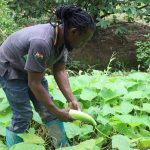Kaieteur News (Aug 15, 2016)
Concern is being raised about the use of artificial chemical agents to expedite the ripening of fruits, with some questioning its prevalence and how harmful it actually is. However, one agricultural expert has offered some clarity on the issue.
According to Chief Executive Officer (CEO) of the National Agricultural Research and Extension Institute (NAREI), Dr. Oudho Homenauth, its use in Guyana is actually negligible. He stated that the natural method of ripening was actually more popular locally.
This natural method, Dr. Homenauth explained, involved placing pre ripe fruits alongside those that were actually ripening. He stated that as the fruit ripens, it emits a gas which can accelerate the ripening process.
In fact, he explained, chemical agents which are used for artificial ripening most likely contain these very properties. He noted that agents like Ethephon were not necessarily harmful. Dr. Homenauth stated that harm is more likely to be caused by the usage of pesticides on ripe fruits.
That being said, Dr. Homenauth said that there is a regulatory frame work governing those who export fruits.
He noted that exporters must be registered with the Pesticides and Toxic Chemicals Control Board (PTCCB). This Board is tasked with licensing, registering, training and inspecting those who use pesticides and toxic chemicals. It is also in charge of public awareness in these issues.
Pesticides and toxic chemicals which are banned are also gazetted, to ensure that the public is aware of them.
Ethephon is one of the most widely used plant growth regulators. It uses Ethylene, a natural plant hormone used in agriculture to ripen fruits.
Fruits ripen naturally when a chemical breakdown within the fruit occurs. As they ripen, the chlorophyll breaks down, causing a change in the fruit’s colour.
Guyana, which held the sobriquet the ‘breadbasket of the Caribbean’, produces a wide variety of fruits. But this considered as nontraditional crop production, however, as sugar and rice are the main agriculture exports.
Last year, Minister of Agriculture Noel Holder had stated that boosting the nontraditional sector would be a major focus for the administration over the next five years. He had said that research, innovation and technology would need to be increased so the sector could flourish.
There are certain measures on going to boost fruit production in Guyana, as it has been recognised for its potential not only for export, but also job creation.. Currently, there is a US$11M project in the pipelines to revive the fruit and vegetable cultivation in areas that were previously neglected.
The project, the Rural Agricultural Infrastructure Development Project, is being administered as a partnership between the Government of Guyana and the Caribbean Community (CARICOM) Development Fund.







